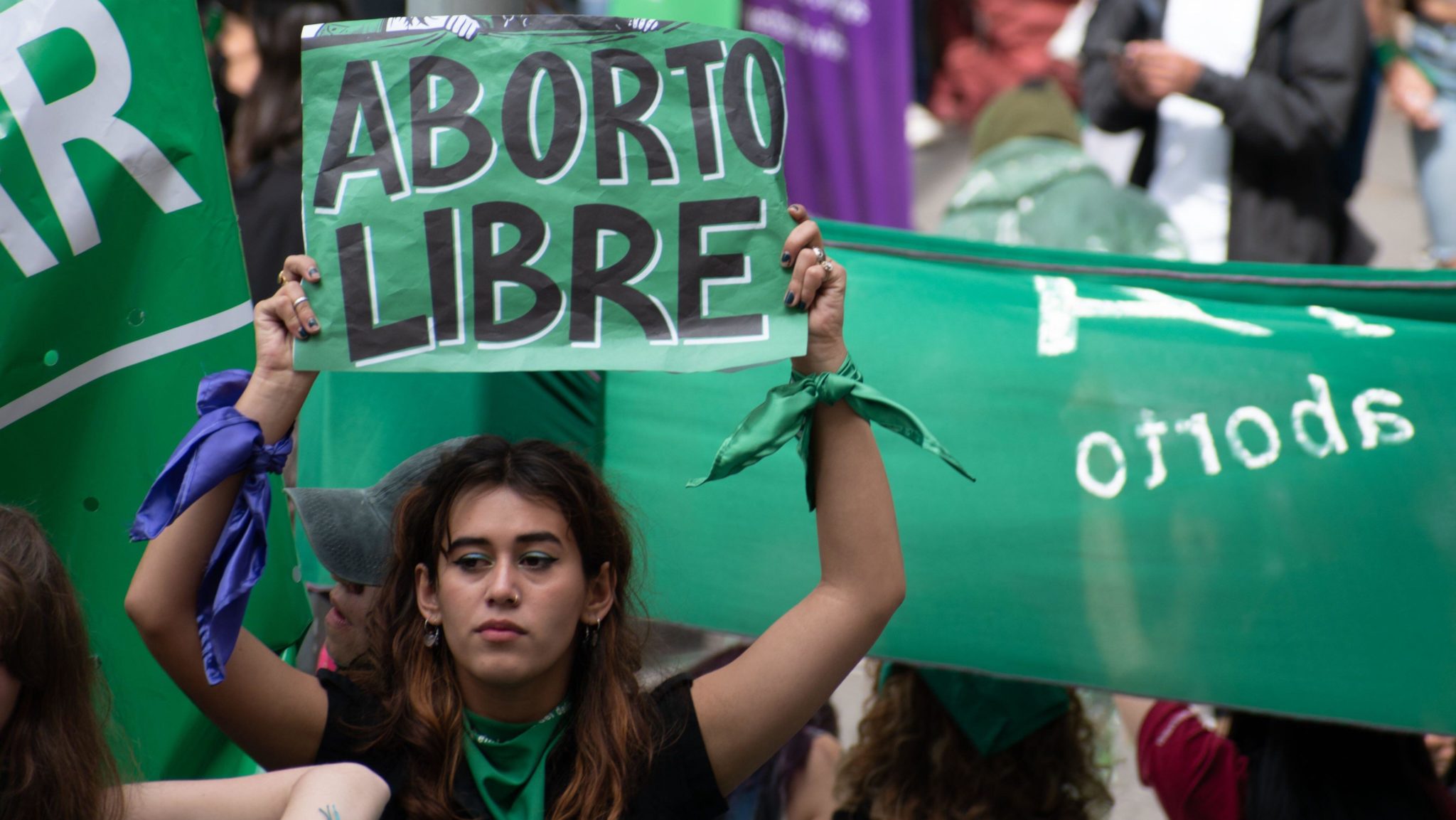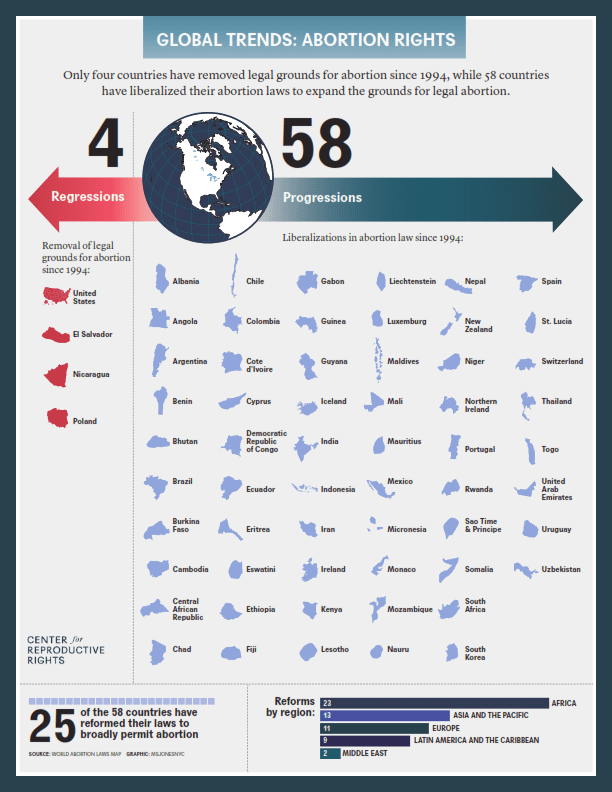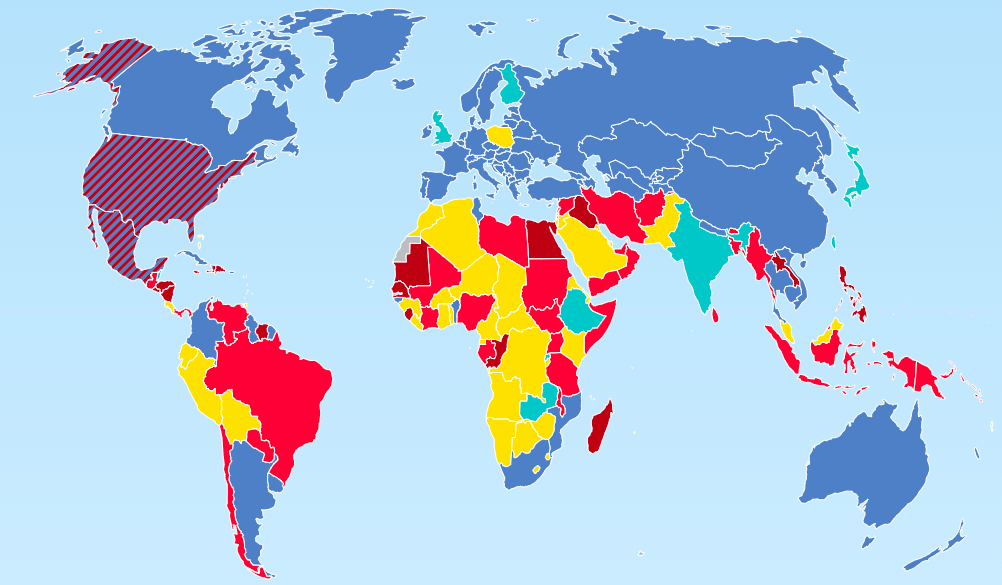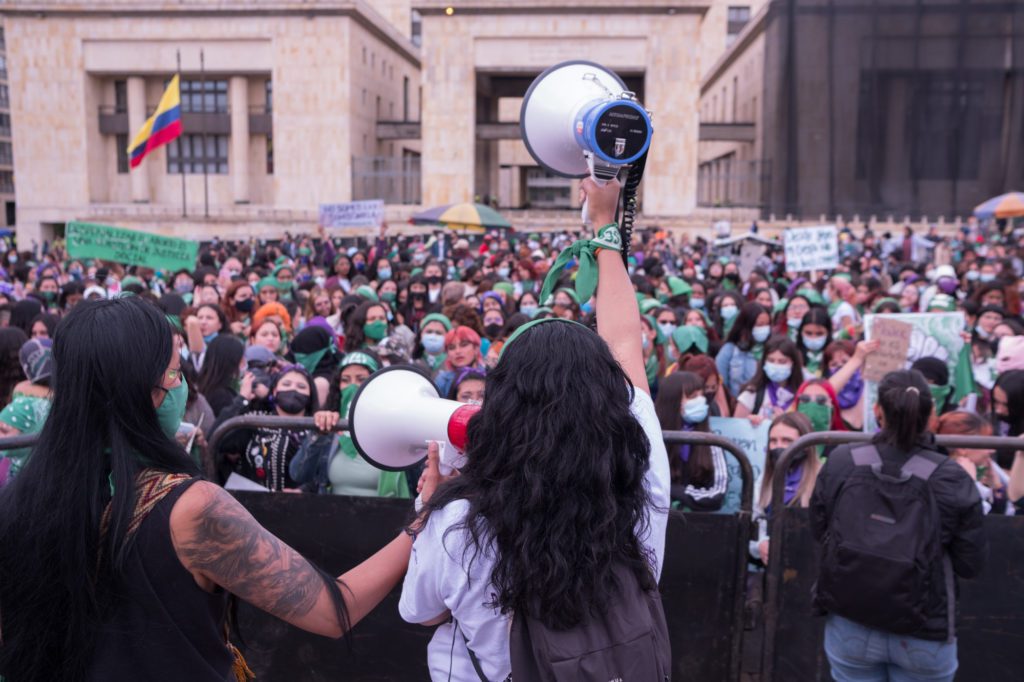With its Regression on Abortion Rights, the U.S. is a Global Outlier
The United States is one of only four countries that has rolled back abortion rights since 1994.

When the U.S. Supreme Court took away the constitutional right to abortion in June, the United States became an outlier to the overwhelming global trend toward liberalization of abortion laws.
The Court’s ruling in Dobbs v. Jackson Women’s Health Organization stands in stark contrast to decades of international progress on abortion rights and has left the United States out of step with human rights and global trends.
“Advancements across every region of the world demonstrate the increasing recognition that abortion access is essential to health, justice, liberty, and equality.” — Risa Kaufman
“The Supreme Court’s decision marked the first time in history that the Court revoked a fundamental liberty right—one that was relied on for generations,” said Risa Kaufman, Director of U.S. Human Rights for the Center for Reproductive Rights. “This devastating setback has left the United States out of step with the global trend and with human rights, as support for liberalizing abortion access continues to grow worldwide. Advancements across every region of the world demonstrate the increasing recognition that abortion access is essential to health, justice, liberty, and equality.”
Nearly 60 countries have liberalized their laws and policies on abortion since 1994. The United States is one of only four countries that has rolled back abortion rights over that period, joined by El Salvador, Nicaragua, and Poland.
In their dissenting opinion in Dobbs, Justices Breyer, Sotomayor, and Kagan recognized that the Supreme Court’s decision defied global trends by undermining abortion access. As the justices wrote, “In light of [the] worldwide liberalization of abortion laws, it is American States that will become international outliers after today.”
By revoking federal constitutional protections for abortion rights, the Supreme Court cleared the way for states to ban abortion entirely. Eleven states have already made abortion illegal since the Court’s ruling.
Abortion Liberalization Around the World
The Supreme Court’s decision to overturn Roe v. Wade may embolden those who oppose abortion in countries outside the United States, but the decision itself cannot and should not reverse the global trend of abortion liberalization, which is secure. Rather, the Dobbs decision also has the potential to galvanize the current wave of popular movements for abortion liberalization. “Globally, the trend is overwhelmingly towards greater respect for reproductive rights,” said Leah Hoctor, Senior Regional Director of Europe for the Center. “In every region, countries are removing bans and restrictions on abortion.”
From Colombia to Nepal, recent international victories for abortion access include:
Infographic: Global Abortion Trends
See the dozens of countries that have liberalized their abortion laws—and the very few, including the U.S.—that have regressed on abortion rights with this new Center infographic.
- Latin America and the Caribbean—The power of the Latin American regional movement, known as the “green wave,” ushered in a spate of legalization and transformative advancements in sexual and reproductive rights. In February, the Colombian Constitutional Court made the historic decision to decriminalize abortion until the 24th week of gestation, after which Colombians can continue to access care on certain grounds. In 2021, an Argentina law also legalized abortion and Mexico’s Supreme Court recognized safe, legal, and free abortion as a constitutional right.
- Europe—European countries and jurisdictions including Belgium, Cyprus, France, Germany, Gibraltar, Iceland, Ireland, North Macedonia, the Netherlands, Northern Ireland, and San Marino have recently eliminated legal and political restrictions on abortion. Today, nearly all of Europe permits abortion on request or on broad social grounds, with only five out of 47 countries continuing to maintain highly restrictive laws. In June, the European Parliament adopted a resolution that condemned abortion regression in the United States ahead of the Supreme Court’s ruling in Dobbs. Following the Dobbs decision, European leaders, such as President Emmanuel Macron of France and Prime Minister Pedro Sánchez of Spain, condemned the eradication of the constitutional right to abortion in the United States.
- Asia and the Pacific— Between 2018 and 2021, New Zealand, South Korea, Thailand, and several Australian states and territories decriminalized abortion or increased gestational limits. Nepal also passed the Safe Motherhood and Reproductive Health Rights Act in 2018, umbrella legislation that permits abortion up to 28 weeks of pregnancy under certain conditions. Countries including Bangladesh and the Philippines continue to move toward full decriminalization of abortion.
- Africa—Forty-two out of 55 African countries have ratified or acceded to the Protocol to the African Charter on Human and People’s Rights on the Rights of Women in Africa, which recognizes the right to receive medication abortion and other reproductive health care. In 2019, the High Court of Kenya recognized abortion as a fundamental right, which it reaffirmed in 2022. Zambia, Uganda, and Benin have also taken steps to protect and expand abortion rights.
Abortion Access and International Human Rights
Over the past 30 years, international human rights bodies and regional courts have confirmed that abortion is a human right. UN human rights treaty monitoring bodies and regional human rights bodies, courts, and commissions, including the European Court of Human Rights, the Inter-American Court of Human Rights, and the African Commission on Human and Peoples’ Rights, have established that abortion is necessary to protect the rights to life, health, non-discrimination, information, and privacy, as well as freedom from ill-treatment, harmful practices and gender-based violence, among others.
Member states are obligated to uphold abortion rights under numerous United Nations (UN) human rights treaties, including Convention Against Torture (CAT), the International Covenant on Civil and Political Rights (ICCPR), and the Convention on the Elimination of All Forms of Discrimination Against Women (CEDAW). For example, the UN Human Rights Committee has made clear that the ICCPR prohibits State parties from passing abortion restrictions that “jeopardize women’s and girls’ lives, subject them to physical or mental pain or suffering…, discriminate against them or arbitrarily interfere with their privacy.”
After the Supreme Court overturned Roe v. Wade, UN High Commissioner for Human Rights Michelle Bachelet reiterated human rights protections for abortion and the impact that the decision will have on the fundamental rights of millions within the United States, particularly people with low incomes and belonging to racial and ethnic minorities. Independent UN human rights experts similarly denounced the decision.
The UN Committee on the Elimination of Racial Discrimination (CERD Committee) also noted deep concerns with the decision and recommended that the United States address the disparate impact that it will have on racial and ethnic minorities, Indigenous women, and those with low incomes.
“International human rights bodies have called upon governments around the world to treat abortion as an issue of human rights and as an essential health service,” explained Kaufman.
In March 2022, the World Health Organization, the leading global public health expert body, published an updated Abortion Care Guideline which recognizes abortion as an essential health service that is necessary to the realization of human rights.
The World’s Abortion Laws Map
Explore each county’s abortion laws and policies with this interactive tool.
The Disproportionate Impact of Abortion Restrictions Worldwide
Human rights bodies also recognize that abortion restrictions disproportionately harm marginalized communities. In the United States, the Dobbs decision falls hardest on women and others who already face discriminatory obstacles to health care—particularly Black, Indigenous, and other people of color, those with disabilities, people in rural areas, young people, those who are undocumented, and people who are living on low-incomes or living in poverty.
The UN Committee on Economic, Social and Cultural Rights (CESCR) notes that abortion restrictions most directly affect marginalized groups, such as women living in poverty or with less formal education, which “undermine[s] the autonomy and right to equality and non-discrimination in the full enjoyment of the right to sexual and reproductive health.” Similarly, the UN Human Rights Committee and CEDAW note that abortion restrictions pose greater risks for people who are in poverty, who belong to marginalized groups, and who live in rural areas.
Read more about global trends toward abortion liberalization:




